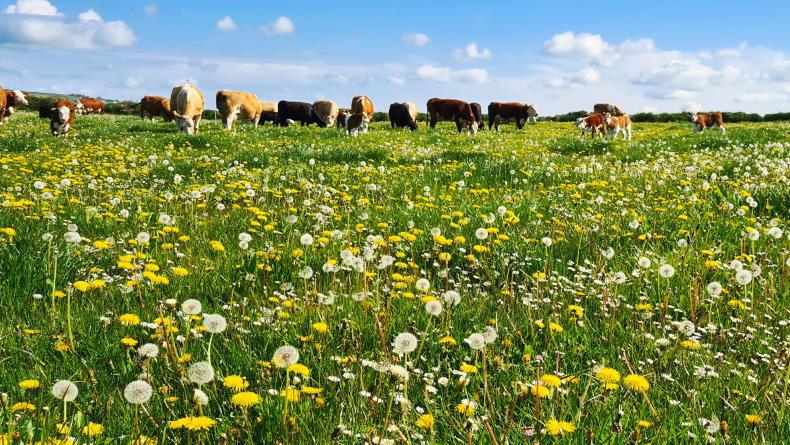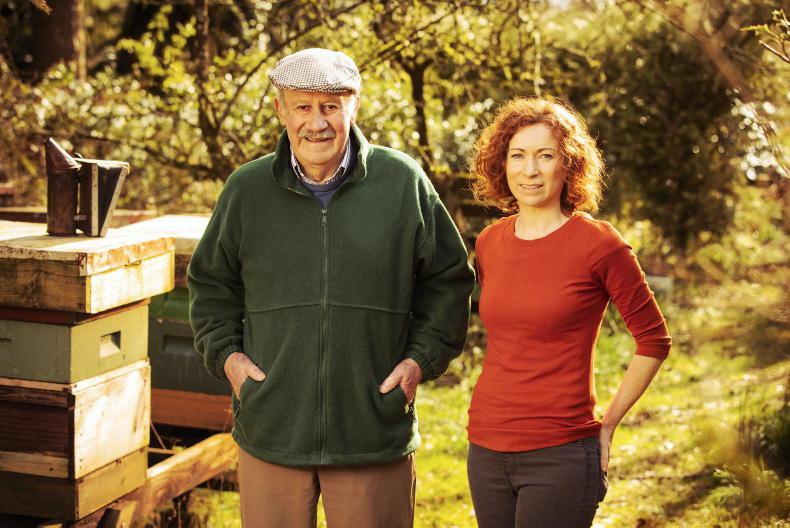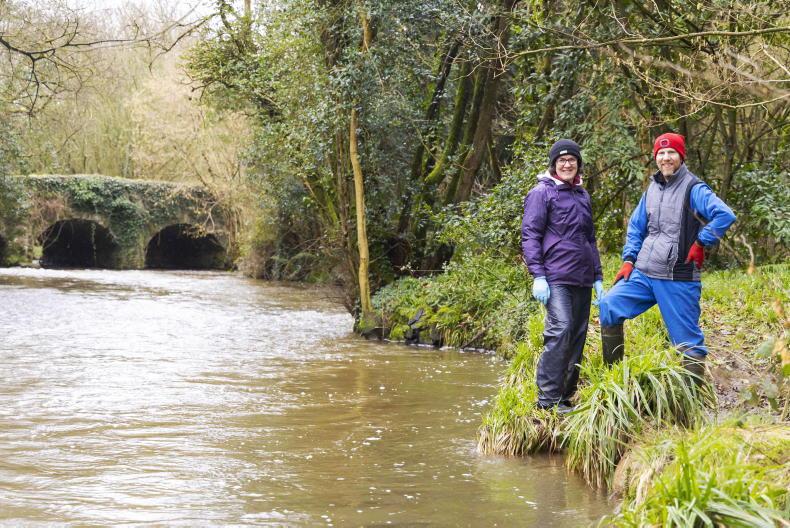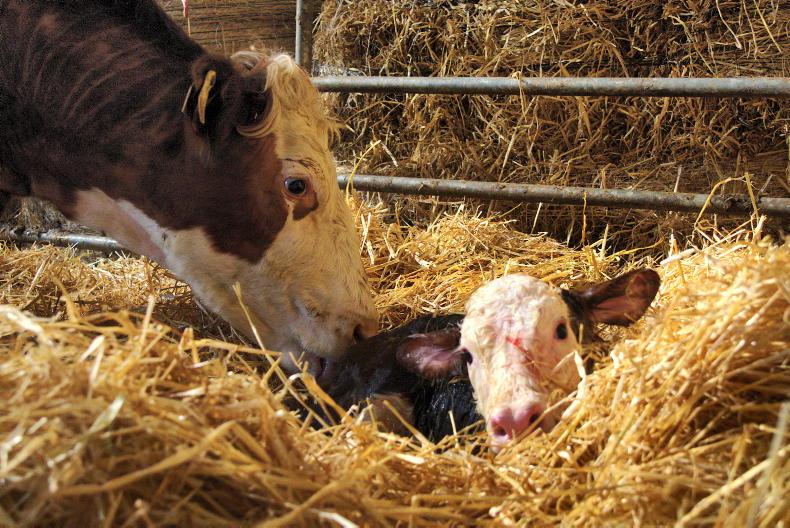As we head into the summer, nature is beginning to blossom on the farm. Biodiversity has a central role to play in sustainable farming and here are some ways that farmers can improve biodiversity on their farms over the next few months.
May is the month in which early varieties of red clover will be flowering. Clover fixes nitrogen (N) and can help farmers decrease their artificial N use, as well as producing silage that is higher in protein than conventional fodder. Using less artificial N on fields with clover will encourage it to grow. In addition to this, bumblebees love the nectar that it produces when it blooms.

Suckler cows grazing a pollinator-friendly sward on Tommy Moyles’ farm at Ardfield, Clonakilty. Clover flowers takeover from dandelions from May onwards.
This month is also the time when a variety of flowers emerge. Early purple orchids and bitter vetches may appear in the shade of a hedgerow. Yellow rattle, milkworts and speedwells begin to show in unimproved grasslands, and any number of weeds flower everywhere. Farmers should consider leaving areas of fields untopped so that thistle, yarrow, self-heal and plantain can be a source of nectar for the pollinators, as well as seeds for bird species like finches.
Believe it or not, flowers or weeds can be great indicators of site management and soil health, such as soil compaction or soil acidity. Weeds such as dandelions, while holding benefits for pollinators, also have large taproots which are great for breaking up compaction and absorbing nutrients from below.

A pollinator patch being planted on Tullamore Farm. Note the whitethorn hedge in flower to the right.
May also sees first cuts of silage being taken across the country. While it may not always be possible, farmers could consider if they can leave an uncut strip along a field margin, or manage fields for later cuts or hay. This can provide bees and other pollinators with the continuous supply of flowers needed to forage.
They are busy at work over the summer pollinating many food plants such as strawberries, tomatoes and apples. Research has shown that pollinator activity has the potential to boost oilseed rape yields by approximately 30%, which provides a good reason to reduce pesticides and help pollinators.
With lots of farm machinery on the go during the summer, it’s always good to remember simple ways to reduce fuel consumption. Farmers can turn off the engine instead of letting the tractor idle and remove unnecessary tractor weights. These measures can save over 1l/hour of fuel. Tyre pressure should also be checked regularly, as lower pressures for field work will reduce fossil fuel use.
Sheep dipping will also be getting under way on farms next month. Leaking of sheep dips can lead to serious pollution of watercourses, including drinking water and large-scale fish kills. To avoid this happening, farmers should ensure that dipping tanks, whether portable or not, are leak proof and that they are located as far away as possible from drains and watercourses.

Leaking of sheep dips can lead to serious pollution of watercourses, including drinking water.
A drip pen should be used, and sheep should be kept away from watercourses for at least 24 hours. It’s also important to note that while dips are harmful to the environment, they are also harmful to humans. Dips which contain organophosphate are linked to different types of cancer. The effects of exposure can build up over time and continued usage. If possible, alternatives such as pour-ons can be explored.
As we head into the summer, nature is beginning to blossom on the farm. Biodiversity has a central role to play in sustainable farming and here are some ways that farmers can improve biodiversity on their farms over the next few months.
May is the month in which early varieties of red clover will be flowering. Clover fixes nitrogen (N) and can help farmers decrease their artificial N use, as well as producing silage that is higher in protein than conventional fodder. Using less artificial N on fields with clover will encourage it to grow. In addition to this, bumblebees love the nectar that it produces when it blooms.

Suckler cows grazing a pollinator-friendly sward on Tommy Moyles’ farm at Ardfield, Clonakilty. Clover flowers takeover from dandelions from May onwards.
This month is also the time when a variety of flowers emerge. Early purple orchids and bitter vetches may appear in the shade of a hedgerow. Yellow rattle, milkworts and speedwells begin to show in unimproved grasslands, and any number of weeds flower everywhere. Farmers should consider leaving areas of fields untopped so that thistle, yarrow, self-heal and plantain can be a source of nectar for the pollinators, as well as seeds for bird species like finches.
Believe it or not, flowers or weeds can be great indicators of site management and soil health, such as soil compaction or soil acidity. Weeds such as dandelions, while holding benefits for pollinators, also have large taproots which are great for breaking up compaction and absorbing nutrients from below.

A pollinator patch being planted on Tullamore Farm. Note the whitethorn hedge in flower to the right.
May also sees first cuts of silage being taken across the country. While it may not always be possible, farmers could consider if they can leave an uncut strip along a field margin, or manage fields for later cuts or hay. This can provide bees and other pollinators with the continuous supply of flowers needed to forage.
They are busy at work over the summer pollinating many food plants such as strawberries, tomatoes and apples. Research has shown that pollinator activity has the potential to boost oilseed rape yields by approximately 30%, which provides a good reason to reduce pesticides and help pollinators.
With lots of farm machinery on the go during the summer, it’s always good to remember simple ways to reduce fuel consumption. Farmers can turn off the engine instead of letting the tractor idle and remove unnecessary tractor weights. These measures can save over 1l/hour of fuel. Tyre pressure should also be checked regularly, as lower pressures for field work will reduce fossil fuel use.
Sheep dipping will also be getting under way on farms next month. Leaking of sheep dips can lead to serious pollution of watercourses, including drinking water and large-scale fish kills. To avoid this happening, farmers should ensure that dipping tanks, whether portable or not, are leak proof and that they are located as far away as possible from drains and watercourses.

Leaking of sheep dips can lead to serious pollution of watercourses, including drinking water.
A drip pen should be used, and sheep should be kept away from watercourses for at least 24 hours. It’s also important to note that while dips are harmful to the environment, they are also harmful to humans. Dips which contain organophosphate are linked to different types of cancer. The effects of exposure can build up over time and continued usage. If possible, alternatives such as pour-ons can be explored.













SHARING OPTIONS